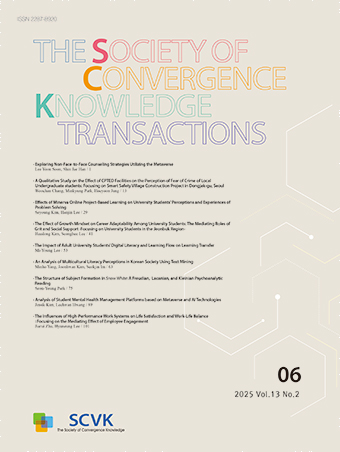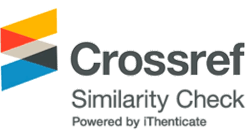Research Article
-
OECD, "Digital Government Index", retrieved from
https://www.oecd.org/gov/digital-government-index-4de9f5bb-en.htm , 2019. -
J. Marsh, "The digital literacy skills and competences of children of preschool age", Media Education Studies & Research, Vol. 7, No. 2, pp. 197-214, 2016.
-
J. Sefton-Green, J. Marsh, O. Erstad, R. Flewitt, "Establishing a research agenda for the digital literacy practices of young children: A white paper for COST action IS1410", 2016.
-
K. Kumpulainen, H. Sairanen, A. Nordström, "Young children's digital literacy practices in the sociocultural literacy contexts of their homes", Journal of Early Childhood Literacy, Vol. 20, No. 3, pp. 441-590, 2020.
-
B. Green, "Subject-specific literacy and school learning: A focus on writing", Australian Journal of Education, Vol. 32, No. 2, pp. 156-179, 1988.
-
M. M. Neumann, G. Finger, D. Neumann, "A conceptual framework for emergent digital literacy", Early Childhood Education Journal, Vol. 45, pp. 471-479, 2017.
-
S. Cao, C. Dong, H. Li, "Emergent digital literacy in Chinese preschoolers: Developmental patterns and associated predictors", Early Child Development and Care, Vol. 194, No. 2, pp. 281-295, 2024.
-
S. Chaudron, R. Di Gioia, M. Gemo, "Young Children (0-8) and Digital Technology. A qualitative study across Europe", EUR 29070, Publication Office of the European Union, 2018.
-
J. Fraillon, J. Ainley, W. Schulz, T. Friedman, D. Duckworth, "Preparing for life in a digital world: IEA international computer and information literacy study 2018 international report", 2020. [Online]. Available:
https://doi.org/10.1007/978-3-030-38781-5 -
J. Fraillon, J. Ainley, W. Schulz, T. Friedman, E. Gebhardt, "Preparing for life in a digital age: The IEA international computer and information literacy study international report", Springer Open, 2014. [Online]. Available:
https://doi.org/10.1007/978-3- 319-14222-7 -
M. Claro, D. D. Preiss, E. San Martín, I. Jara, J. E. Hinostroza, S. Valenzuela, F. Cortes, M. Nussbaum, "Assessment of 21st century ICT skills in Chile: Test design and results from high school level students", Computers & Education, Vol. 59, No. 3, pp. 1042-1053, 2012. [Online]. Available:
https://doi.org/10.1016/j.compedu.2012.04.004 -
Q. Liang, J. de la Torre, N. Law, "Do background characteristics matter in children's mastery of digital literacy? A cognitive diagnosis model analysis", Computers in Human Behavior, Vol. 122, p. 106850, 2021.
-
F. Siddiq, P. Gochyyev, M. Wilson, "Learning in digital networks - ICT literacy: A novel assessment of students' 21st century skills", Computers & Education, Vol. 109, pp. 11-37, 2017. [Online]. Available:
https://doi.org/10.1016/j.compedu.2017.01.014 -
L. Plowman, O. Stevenson, C. Stephen, J. McPake, "Preschool children's learning with technology at home", Computers & Education, Vol. 59, No. 1, pp. 30-37, 2012.
-
U. Bronfenbrenner, P. A. Morris, "The bioecological model of human development", in Handbook of child psychology: Vol. 1, Theoretical models of human development, 6th ed., R. M. Lerner & W. Damon, Eds., Wiley, pp. 793-828, 2006.
-
L. S. Vygotsky, M. Cole, V. John-Steiner, S. Scribner, E. Souberman, "Mind in society: The development of higher psychological processes", Eds. & Trans., Harvard University Press, 1978.
-
G. M. Johnson, K. P. Puplampu, "Internet use during childhood and the ecological techno-subsystem", Canadian Journal of Learning and Technology, Vol. 34, No. 1, 2008.
-
L. B. Hurwitz, K. L. Schmitt, "Can children benefit from early internet exposure? Short- and long-term links between internet use, digital skill, and academic performance", Computers & Education, Vol. 146, p. 103750, 2020.
https://doi.org/10.1016/j.compedu . 2019.103750. -
Y. Jiang, H. Monk, "Young Chinese-Australian children's use of technology at home: Parents' and grandparents' views", Asia-Pacific Journal of Research in Early Childhood Education, Vol. 10, No. 1, pp. 87-106, 2015.
https://doi.org/10.17206/ apjrece.2016.10.1.87 -
J. Lepičnik, P. Samec, "Communication technology in the home environment of four-year-old children", Comunicar, Vol. 20, No. 40, pp. 119-126, 2013.
https://doi.org/10.3916/C40-2013-03-02 -
L. M. Takeuchi, R. Stevens, "The new co-viewing: Designing for learning through joint media engagement", The Joan Ganz Cooney Center at Sesame Workshop, New York, 2011.
-
A. R. Lauricella, R. Barr, S. L. Calvert, "Parental co-use of media technology with their young children in the USA", Journal of Children and Media, Vol. 8, No. 1, pp. 30-48, 2014.
-
G. Ozturk, S. Ohi, "Understanding young children's attitudes towards reading in relation to their digital literacy activities at home", Journal of Early Childhood Research, Vol. 16, No. 4, pp. 393-406, 2018.
-
J. McPake, L. Plowman, C. Stephen, "Pre-school children creating and communicating with digital technology in the home", British Journal of Educational Technology, Vol. 44, No. 3, pp. 421-431, 2012.
-
이승민, 강두봉, "초등학생을 위한 디지털 리터러시 검사 도구 개발 및 검증", 정보교육학회논문지, Vol. 25, No. 1, pp. 59-69, 2021.
https://doi.org/10.14352/jkaie.2021.225.1.59 -
M. M. Neumann, D. L. Neumann, "Touch screen tablets and emergent literacy", Early Childhood Education Journal, Vol. 42, No. 4, pp. 231-239, 2014.
https://doi.org/10.1007/s10643-013-0608-3 -
S. Livingstone, E. J. Helsper, "Maximizing opportunities and minimizing risks for children online: The role of digital skills in emerging strategies of parental mediation", Journal of Communication, Vol. 67, No. 1, pp. 82-105, 2017.
https://doi.org/10.1111/jcom.12277 -
S. Willams, S. M. Ogletree, "Preschool children's computer interest and competence: Effects of sex and gender role", Early Childhood Research Quarterly, pp. 135-143.
https://doi.org/10.1016/0885-2006(92)90023-R
- Publisher :The Society of Convergence Knowledge
- Publisher(Ko) :융복합지식학회
- Journal Title :The Society of Convergence Knowledge Transactions
- Journal Title(Ko) :융복합지식학회논문지
- Volume : 13
- No :1
- Pages :75-86
- DOI :https://doi.org/10.22716/sckt.2025.13.1.007




 The Society of Convergence Knowledge Transactions
The Society of Convergence Knowledge Transactions







